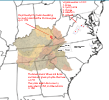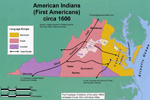The Jarrells of Floyd County, Kentucky Was Susannah Parks a Cherokee? |
|
Political correctness note: there's a lot of variation in the preferred terminology for the indigenous cultures of the Americas. Some prefer Native American, some prefer Indigenous, and some prefer Indian. It appears that the Cherokee prefer to call themselves Cherokee, but both Native American and American Indian are acceptable to them (Cherokee Phoenix, Smithsonian National Museum of the American Indian). There are internet claims that Susannah Parks (1751-1825) (wife of William Jarrell) was a full-blooded Cherokee. Is it true? Probably not. The available records suggest that before her birth, the Parks family was never in the right place at the right time to even know any Cherokee. In addition, English-style marriages between Indians and settlers were very rare due to the social conditions of the time, and both communities frowned on the practice. At least in the beginning, this opposition to intermarriage seems to have been primarily a religious/cultural issue, not a question of skin color. The settlers in general thought it was deeply sinful to marry a non-Christian or to live like a "savage". The indigenous population thought the European religion and lifestyle was unappealing, and they could see for themselves that the Englishmen (at least in early Virginia) were so ignorant of hunting, fishing and farming that they couldn't even feed themselves, which meant they were undesirable marriage partners. There were certainly some casual hookups (the Native culture had a more relaxed attitude toward sex than English culture did), and the frequent violent clashes between the groups provided the opportunity to mix genes through rape. But marriage was a different matter. Settlers who deserted their own culture to live with the Indians were severely punished if caught, at least in the early days of settlement, so there was little assimilation of the English into the Native culture. My Pocahontas article details the attitude toward intermarriage in Virginia. To Make Them Like Us describes the attitudes in Virginia and New England, and reports that even in New France (where missionaries encouraged intermarriage) there were few cases where a settler married a Native and the couple remained in the European community. I couldn't find any specific information about North Carolina and other locations in or near Cherokee territory; but I'd expect the attitude to be similar. The official Cherokee Nation website says that the first known missionary to the Cherokee was a Jesuit who arrived in 1736, and the first known Cherokee conversion to Christianity was in 1773. It looks like Christianity didn't really take off among the Cherokee until the 19th century. This lack of Christianity was a major impediment to marriage and assimilation into the white community. What opportunities did
the Parks family have to marry into the Indigenous community,
Cherokee or otherwise? The Parks family has better documentation
than many colonial families, largely thanks to E.M. Parks who
recorded genealogical information in his diary in 1848. The
Thomas Parks website has copies of the diary (scans of the
original and a typed transcript), as well as legal documents
relating to the family. The links on that site don't always work for
everyone, but there is an alternate transcript at
USGWarchives that is less complete and accurate than the first
one. There is a well-researched, 760-page article called
The Parks and Related Families that is only available on Archive.org; from now on I will call it The Parks for
simplicity (note: the article has little information on William
and Susannah, and seems unaware that they eventually moved to
Kentucky).
The Parks doesn't entertain the slightest
suspicion that the family might have Native ancestry. Page 9 has a list of about 60
people named Park or Parks who immigrated to Virginia before 1732;
there is no shortage of English people who might be the founder of
the colonial Parks line. The first person who can definitely be documented as an ancestor of
Susannah Parks is her grandfather Thomas Parks, and the chapter on
him begins on Page 14 of The Parks. Page 15 promotes the idea
that he may have immigrated into Orange County VA in 1741, but there
are other possibilities. He may have been born in Virginia, and
might be the same Thomas Parks who was recorded as a schoolmaster in
Essex County in 1693, and/or the same Thomas Parks who received a
land lease in Spotsylvania County in 1728. He is definitely the same
Thomas Parks whose will was presented to the Court of Albemarle
County VA in 1761. The
1752
will makes the standard references to God that were customary at
the time. The will doesn't prove his ethnicity, but it does
prove that he was a member of the English community and not living a
tribal lifestyle, and that he was a Christian 20 years before the first
known Cherokee conversion. I'm inclined to think that Thomas Parks was born
in Virginia. If he was an immigrant who arrived in 1741, then
all his children (estimated birthdates 1706-1725) must have been
immigrants too, and maybe some of the grandchildren as well.
The children could have arrived in Virginia years before their
father did; but they must have been conceived and born in the old
country. Thomas' birthdate is usually estimated around 1670, so if
he immigrated in 1741 he would have been about 70 years old at the
time; a very advanced age for a difficult sea crossing. Based on the
birthdates of his children, he probably wasn't born any later than
1685. The diary of
E.M. Parks makes no mention of birthplaces, except to say that
all the children of Thomas' son John Parks were born in Virginia in 1733-1759.
If the older generations were foreign born, it seems like that would
have been worth mentioning.
If Thomas Parks' children were American-born, then
Thomas must have been here before the birth of his son John on
5/18/1706.
The Parks page 9
doesn't show anyone named Thomas Parks arriving in
Virginia between 1691 (the approximate date that Thomas turned 21)
and 1706. These records could be incomplete of course, and our
estimate of Thomas Parks' birthdate could be off. But it's
documented that he died in 1761, so he couldn't have been born too
much earlier than 1670.
The counties that have been
associated with the Parks family were in Powhatan or Monacan territory. So if we
want
to ascribe any Native ancestry to this family, we shouldn't be
looking at the Cherokee. But there were impediments to marriage with
other tribes too. My
Pocahontas article describes the apartheid policies that the
English put in place in 1632 and updated in 1646, essentially
banning the Powhatan tribes and all other Indians from English territory; and the Powhatan
tribes were nearly extinct by 1722. There were only three known
English-Native marriages in the 1600s, and none of them involved the
Parks family
(Pocahontas article). Virginia passed a law in 1691 banning marriage between whites and a "negroe,
mulatto, or Indian" (Encyclopedia
Virginia). Interracial marriage remained illegal in Virginia
until 1967, when it was overturned by the Supreme Court (NYPL). The estimated birthdate of Thomas Parks (Susannah's grandfather) is 1670, so he would have turned 21 around 1691.
If he was already living in Virginia, he didn't have much time to marry an Indian before it became
illegal. Nothing is known about the wife
of Thomas Parks, but under the circumstances it seems unlikely
that she was Powhatan.
It's also unlikely that she was Monacan. The Monacan had little
contact with English settlers, and lost control of their territory
due to pressure from other tribes before the English had made it that
far west. The tribe still survives, and is currently
headquartered in Amherst County (Virginia
Places). It doesn't look like any particular tribe took control
of the Monacan lands after they were displaced. Instead, it looks
like there may have been a power vacuum in the area that was
eventually filled by English settlers (History
of Loudoun County,
Wikipedia). What about the next generation? The parents of Susannah Parks
were John Parks and Mary Sharp. We've already established that
John Parks was unlikely to have any Indian ancestry. Mary Sharp's
parents can't be documented; but the parents that most internet
trees assign to her are English immigrant Elias Sharpe and Margaret
Proctor, descendant of the well-documented Proctor family that
arrived in Jamestown in 1610. It's much more likely that her
parents were Linsfield and Frances Sharpe (see
Mary Sharpe article)
who also look very European. It's obvious that nobody suspects
Mary Sharp of having Native ancestry, and Virginia's law against
interracial marriage was in full effect when John Parks and Mary
Sharp got married in 1732. The diary of
E.M. Parks records her birthdate and marriage date, but doesn't
mention her ethnicity. If she was Indian, that would be an
interesting fact that might have been worth mentioning. The diary
does mention that her son William was killed by Indians in 1776.
An account of his death on
VAgenweb indicates that he was killed by the Cherokee. He was a
landowner in Powell Valley, which was apparently close enough to
Cherokee territory to be at risk of violence. Susannah Parks married William Jarrell in Rowan County NC on 1/3/1770. The Parks family apparently lived in the part of
Rowan County that became Surry County in 1771, since
The Parks page 102 reports members of the Parks family
paying poll taxes in Surry for most years between 1771-1775. Wilkes
County was formed from Surry County and the "District of Washington"
(now mostly in Tennessee) in 1777. John Parks (Susannah's
father) died in Wilkes County in 1793. Susannah and William
Jarrell lived in Wilkes County until at least 1800, and by 1804 they
had moved to Floyd
County KY with their children. Floyd County is their only place of residence that was ever
part of Cherokee territory; but the Cherokee were already gone when the Jarrells arrived. |
|
Other family history articles:
|

